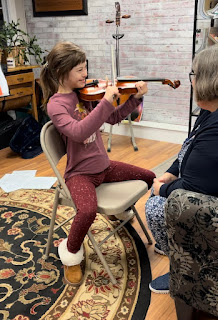M singing with joy at Recital 2023
In the intricate tapestry of life, each individual brings a unique set of strengths, challenges, and aspirations. For parents of children with special needs, nurturing their development and enhancing their quality of life often involves exploring unconventional avenues of learning and growth. Amidst this journey, music emerges as a powerful tool for fostering creativity, communication, and confidence. In this blog post, we explore the transformation brought about by music lessons on special needs children and how it can enrich their lives in profound ways.
Promoting Sensory Integration
For children with sensory processing disorders or autism spectrum disorders, navigating the sensory world can be overwhelming. Music provides a structured yet flexible medium through which they can explore and regulate their sensory experiences. Whether through listening to melodies, feeling the vibrations of instruments, or engaging in rhythmic activities, music lessons facilitate sensory integration, helping children develop greater awareness and control over their sensory responses.
Facilitating Communication and Expression
Communication can pose significant challenges for children with speech or language disorders. Music offers a nonverbal mode of expression that transcends linguistic barriers, allowing children to communicate and connect with others in meaningful ways. Through singing, playing instruments, or improvising melodies, special needs children can express their thoughts, emotions, and innermost feelings, fostering self-expression and self-confidence.
Enhancing Cognitive Skills
Music lessons engage a wide range of cognitive processes, including attention, memory, and problem-solving, making them particularly beneficial for children with cognitive disabilities or learning differences. Learning to read musical notation, understand rhythmic patterns, and coordinate movements fosters cognitive development and executive functioning skills. Moreover, the multidimensional nature of music stimulates various areas of the brain, promoting holistic cognitive growth.
Boosting Social Interaction
Socialization can be challenging for special needs children due to difficulties in social communication or interpersonal relationships. Participating in music lessons provides opportunities for social interaction and collaboration in a supportive environment. Whether through group music activities, ensemble playing, or music therapy sessions, children learn to share, take turns, and cooperate with others, building essential social skills and forming meaningful connections with peers.
Fostering Emotional Well-being
Music has a profound impact on emotions, evoking feelings of joy, serenity, excitement, or nostalgia. For special needs children who may struggle with emotional regulation or mood disorders, music offers a therapeutic outlet for processing emotions and promoting emotional well-being. Engaging in music-making activities can uplift spirits, reduce anxiety, and enhance overall mood, fostering a sense of happiness and contentment.
Celebrating Individuality and Achievement
In the world of music, diversity is celebrated, and individual talents are cherished. Regardless of their abilities or challenges, special needs children can find a sense of belonging and pride through music lessons. Every milestone, no matter how small, is a cause for celebration, reinforcing a positive sense of self-esteem and accomplishment.
In life every child, regardless of their abilities or challenges, deserves the opportunity to discover the power of music. Through sensory integration, communication skills, cognitive reasoning, social interaction, emotional well-being, and the celebration of individuality, music lessons offer a harmonious journey of growth and discovery for special needs children. As parents and caregivers, embracing music as a holistic approach to learning and development can unlock a world of possibilities, nurturing the unique potential within each child and fostering a lifelong love of music.
K trying a violin for the first time.


Comments
Post a Comment